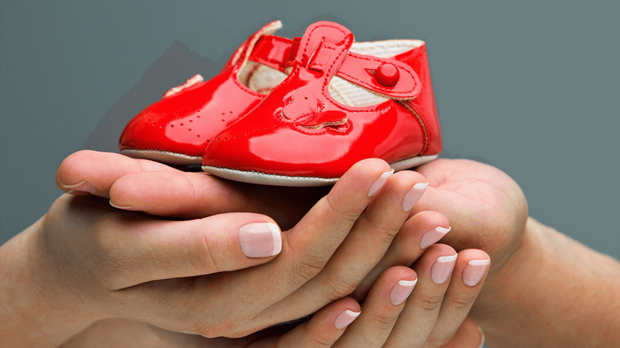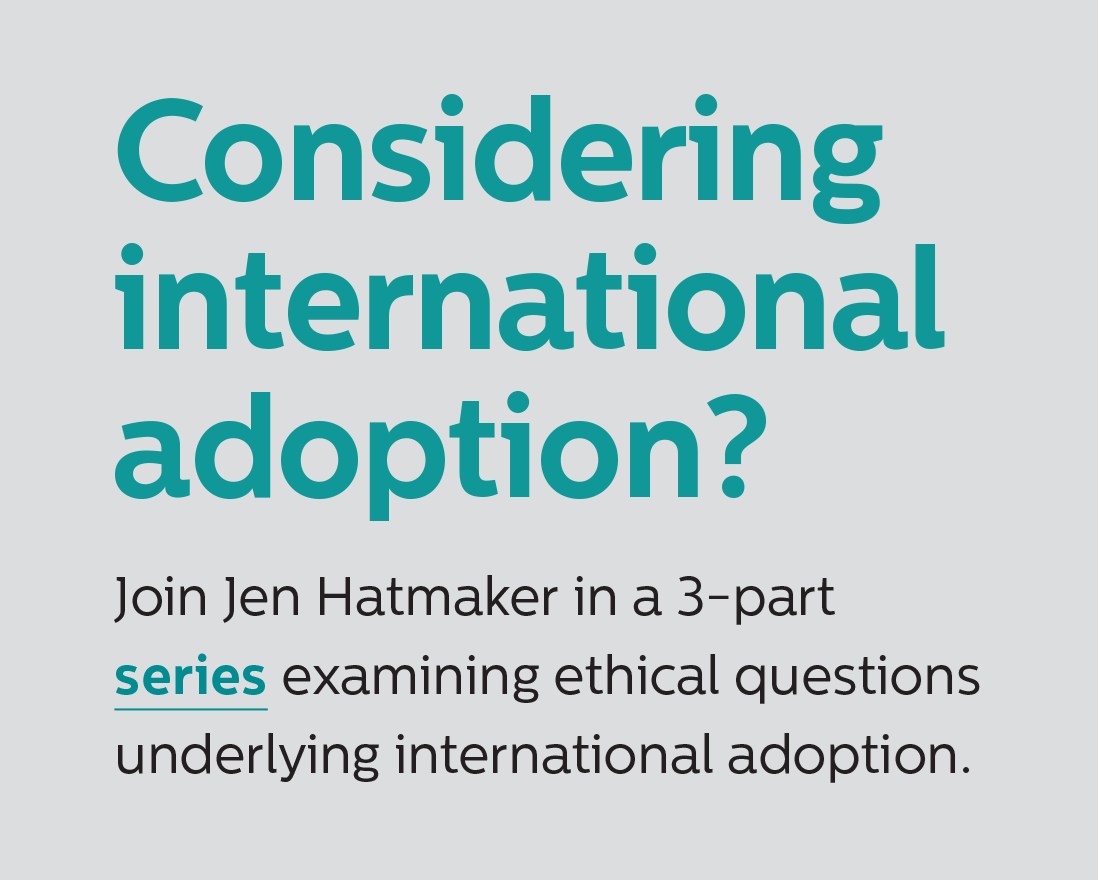Embracing Adoption's Realities

Two births. Two precious girls. Two very different beginnings.
One life began with nine months of careful preparation and daily readings from What to Expect When You're Expecting. The second began with little time to prepare or to read much else than required paperwork. The first began in the early morning in our hometown. The second began in the late evening in a city we'd never seen. The first began with my husband at my side in a labor and delivery room. The second began as we nervously paced the floors of our hotel room, waiting for the phone to ring. The first began with new life that grew in and came from my own body. The second began with new life that developed in and emerged from another young woman's body.
Two births. Two precious girls. Two very different beginnings. One life entered our family through birth, the other entered our family through adoption.
Looking back, I could argue that I wasn't really prepared for the realities of either arrival. Sure, I'd read all about what to do when we brought our first baby home. But I didn't fully grasp the reality of sleep deprivation until I'd experienced four or five nights of nursing on demand. Even though we listened to birthmothers tell their stories as part of our adoption agency's preparation class, we didn't really know how we'd feel when we looked into our birthmother's young and beautiful green eyes. No one could have prepared us for the nervous panic we felt leaving the hospital with our firstborn, unsure that we knew which way the diaper went. And surely no one could have prepared us for the bittersweet mixture of sorrow and joy we felt the moment our daughter left her birthmother's arms for ours.
Ours is an unfolding story of God's grace in the midst of starkly different circumstances. I share it with the hope that it may help others who are considering or beginning the adoption journey prepare for its both beautiful and challenging realities.
Should We Adopt?
Greg and Katina, parents of two biological children, are one such couple. They're considering adoption, praying and thinking about the possibility for their family.
"We have room, we have love," says Katina. "There are so many little people out there who need a good home. Why would we not adopt?"
Katina says they're considering both the practical and spiritual dimensions of adopting a child. "God tells us in Scripture that as Christians, we're to take care of orphans and widows," she says (see James 1:27). "Where do we fit in with that command? Are we called to adopt? Or is God asking us to be involved in some other way?" It's a big question. Greg and Katina are wise to address their concerns and face the realities of adoption before they decide to welcome a child into their family.
We went through a similar thought process before adopting and it helped us anticipate our child's needs before she entered our family. We firmly believe that every aspect of our daughter's life—including her adoption—was ordained by our sovereign, loving God (see Psalm 139:16). We want to understand adoption through the eyes of our child, which sometimes means facing tough questions she may ask about her adoption. Often those questions have become fertile ground for deep, meaningful connections. The longer we parent, the more we've learned to embrace adoption's realities rather than fear them. They are simply part of God's unique plan for our family.
Key Issues to Consider Before Adopting
If you're thinking about adopting, here are a few important factors to consider:
Adoption involves loss. Like it or not, acknowledge it or not, adoption involves loss for everyone involved. Irreparable loss? No. But painful loss. Loss that we'd do well to confront and grieve. For the birthparents, adoption means losing the child they conceived, carried, and blessed with the gift of birth. For the child, adoption begins with separation from the place and person they've known since conception. For many adoptive parents, adoption involves the loss of a dream; perhaps even the loss of a child.
Experts tell us that for adoptive parents, grieving our loss not only helps us, but also helps our child. Sherrie Eldridge, adoption speaker and author of Twenty Things Adoptive Parents Need to Succeed, says that "Grieving loss, both pre- and post-adoption, is a vital principle that frees you up for wholehearted parenting. When your child faces inevitable sadness and loss, his pain may frighten you unless you have already processed your own issues." She explains, "Grieving [infertility loss] clears your vision for the future. You will have the capacity to be a visionary influence in your child's life."
Being okay with the idea that you may never carry another—or any—biological child takes time, prayer, and some important emotional work. To be honest, I'm not sure if it's possible to entirely process it all before you adopt. But the prospect of entering parenthood without the emotional baggage of unresolved grief—the ability to offer our child love from an emotionally healthy place—offers great rewards for us and for our child.
Adoption takes more than love. Amazing children come from tough circumstances: overseas orphanages, multiple foster care placements, unplanned pregnancies, to name a few. These kids need parents who are willing to engage both their hearts and their minds to understand their child's spoken and unspoken emotional needs.
In her book, Wounded Children, Healing Homes, adoption expert Jayne Schooler writes, "Many adoptive parents … begin a fantasy journey of what life will be like. They believe that love will heal all wounds. With that belief, they fail to hear the child's story and aren't open to the potential of how it might affect their family."
When we engage both our hearts and our minds, we begin to help our child find comfort from past hurts. We're not alone and we're not without resources to tackle some of the tough issues. Adoption support groups, adoption-sensitive churches, therapists, and adoption professionals can help us navigate tough times. If we want to hear our child's story and understand her needs, we'll enter adoption with an open heart, an informed mind, and the skills to comfort her.
Adoption requires transparency. The adoption process begins with an immediate need for transparency. As a prospective adoptive parent, you sometimes feel as though you've plunged headfirst into a fishbowl as you share your life, marriage, values, and finances with governmental agencies and attorneys. Your life becomes an open book. Home studies, adoption agency interviews, and endless questionnaires cover some of the most personal details of your lives.
It's probably a good thing that the process begins this way because the need for transparency doesn't end with the adoption proceedings; rather, it carries over into our life-long relationship with our child. From day one, our adopted child needs to know that our home is a safe place to voice adoption-related questions and that we will be open with her about her birth history. Sometimes we don't have all of the answers. Sometimes the answers are painful or age-inappropriate to share in detail. But we build trust—and deeper connections—with our child as we encourage a spirit of openness about adoption in our family. When our child first expressed sadness about not having grown in my womb, I held her, and we both cried over this loss. The grief became our shared experience and it deepened our relationship. Transparency yields trust and connection; secrecy breeds shame and resentment.
Dr. Gregory Keck, Ph.D. and founder of the Attachment and Bonding Center of Ohio, says, "People often are afraid of sharing the truth [about adoption], but truth is always liberating for the child." He likens an adopted child's life to a mosaic with some missing or broken pieces. "Truth completes the child's broken mosaic," he explains. "The more pieces parents can help their child put in place, the more complete—and beautiful—the child's mosaic will become."
Trusting God's Sovereign Plan
Two births. Two precious girls. Two very different beginnings. Yet, both lives share several all-important truths: the same God created both of them; he saw each of them before they were born; every day of their lives is recorded in his book; every moment was laid out before a single day had passed (Psalm 139:16). He knows what he's doing. He has their lives all planned out—plans to take care of them; plans to give them the future they hope for (Jeremiah 29:11). His sovereignty is perhaps the greatest reality in adoption.
Adoption was birthed in the heart of God. It wasn't "Plan B." It's part of his plan for humanity, and thankfully, for our family. As Christians, we need not fear adoption's realities. Our God is big enough to help us handle them all—for us and for our precious, adopted children.
Lisa Abbott is a freelance writer and editor with a heart for adoption. She has edited several books, including Twenty Things Adoptive Parents Need to Succeed (Sherrie Eldridge; Random House, 2009) and Wounded Children, Healing Homes (Jayne Schooler, Betsy Keefer Smalley, and Timothy Callahan; NavPress, 2010) She and her husband, John, live with their two daughters in Indianapolis, Indiana.
Read more articles that highlight writing by Christian women at ChristianityToday.com/Women
 Read These Next
Read These Next

 Examining Adoption EthicsThe Adoption Crisis, Part 1Let’s work together to protect children, birth families, communities, and the kingdom.
Examining Adoption EthicsThe Adoption Crisis, Part 1Let’s work together to protect children, birth families, communities, and the kingdom. Putting Up with ProfanityWhat should you do when your coworkers’ language makes work uncomfortable?
Putting Up with ProfanityWhat should you do when your coworkers’ language makes work uncomfortable?
 Better Sex Begins in the BrainHow to think your way to greater intimacy
Better Sex Begins in the BrainHow to think your way to greater intimacy








 Homepage
Homepage

